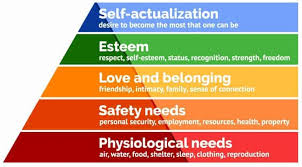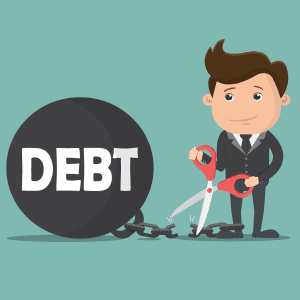This article contains affiliate links for which I may earn a commission if you sign up for services or make a purchase, at no cost to you. Thank you for supporting me by using the links! The opinions and recommendations provided in this article have not been reviewed or endorsed by any of these entities.

There are three fundamental steps to financial independence and you will continue to see these three basic concepts over and over throughout everything you read on this website:
- Pay off debt
- Live Frugal
- Save as Much as Possible
The goal of the pay off debt section is to build the fundamental understanding of what types of debt exist, how to help manage that debt, and a plan to get out of debt!
If you are reading these articles then it is a safe bet that you like the concept of not being in debt and living a life with less stress. Worrying about whether you are going to be able to pay the electric bill at the end of the month or make mortgage is not a mentally healthy way to go through life.
Abraham Harold Maslow was an American psychologist who is best known for creating a hierarchy of needs. Below is a depiction of that hierarchy. The foundation of human needs begins with the basics: air, food, water, shelter, sleep, clothing, and reproduction. Without that foundation there is no way to fully obtain the next level of needs, safety: personal security, employment resources, health, and property. The third level is love and belonging: friendship, intimacy, family, and a sense of connection. The fourth level is esteem: respect, self-esteem, status, recognition, strength, freedom. And the final level is self-actualization which is the desire to become the most that one can be.
So what does this have to do with becoming financially independent???? As I will remind you throughout our journey together that becoming financially independent isn’t about the number of zero’s in your bank account and becoming the richest person you know. It is about developing a way to live your life that allows you to become the best person you can be and enjoying life along the way!
The basic physiological needs that humans require are water, food, shelter, and clothing. In other words, when you are worried about things like making a rent/mortgage payment at the end of the month then it will be impossible to become the most that you can be. To avoid those types of worries you must take control of your finances by developing healthy habits that will allow you to live your life!

In order to develop the healthy habits that will carry you in to financial independence you need some sort of method to track your progress along the way. I use Personal Capital as a way to track my progress. Personal Capital is a personal finance platform that puts all of your financial data (savings, investments, retirement, credit cards, mortgage) in one easy use location. They provide financial planning, tax optimization and advice that is specifically tailored to you. It also provides a free analytical tool which allows you to track your cash flow and helps keep you involved you’re your future.
You can’t manage what isn’t tracked
By utilizing Personal Capital you are giving yourself the tools necessary to track and manage your personal
This company is led by several very talented and experienced people in the financial world and they have taken a straightforward approach towards wealth management. It is free to sign up for and it only takes about 10 minutes to link your accounts to the site.
Is Debt Good or Bad?
Debt, unfortunately, can be a necessary evil when you first start your adult life. Debt can affect several aspects: from an application for renting an apartment, getting a new credit card, purchasing a car, to starting a new business. The amount of debt you have will determine things such as getting accepted for your application to that apartment, your interest rate for credit cards, and even your interest rates when purchasing a vehicle or house. For a more in depth understanding of how debt affects your credit score read my Credit Score article.
The downside to the debt accumulated during that phase in your life is that you are required to pay the company that loaned you money through an agreed upon interest rate. The interest you will pay over the life of the loan can equate to tens of thousands of dollars. Microsoft Excel has a great template you can download which allows you to determine the amount of money that you will pay in interest over the life of the loan. You can find it by opening up Excel, going to a new document and downloading the template labeled Loan Amortization Schedule.
For example, on a 30 year fixed mortgage on a $100,000 house at a 4.0% interest rate you will pay approximately $71,900 in interest alone!!! If you are able to reduce the interest rate to 3.75%, by controlling the amount of debt you have, then the total interest paid over that time is $66,700. A difference of $5,200!
The upside is that going in to debt opens doors that may not have been possible without a loan. A majority of people don’t have the money upfront to pay for college, purchasing a car with cash, or even purchasing a house with cash. The opportunity provided by lenders for you to progress through life may be necessary as you start out in life but it can be a trap!
Have you ever heard of the phrase, “Keeping up with the Joneses?” The idiom is a concept that refers to the comparison to one’s neighbor as a benchmark for social class or the accumulation of material goods. This can be an actual neighbor in your neighborhood, co-workers, or even family members. Everyone knows that one guy/girl who has to have the latest tech gadget or newest car or nicest lawn. All of those desires to have the best and latest/greatest are a TRAP and a very easy way to get in over your head in debt. Don’t fall in this trap!
As you progress through these articles you will find that even the smallest extra payment on an unnecessary item can extend your goal of financial independence. A $100/month difference in your savings over a 15 year period can be a $30,000 difference!
Take away points:
- Being in debt affects your mental health and can be controlled
- You can’t managed what isn’t tracked. Sign up for Personal Capital
- Don’t keep up with the Joneses! $100 can be $30,000 in just 15 years!

